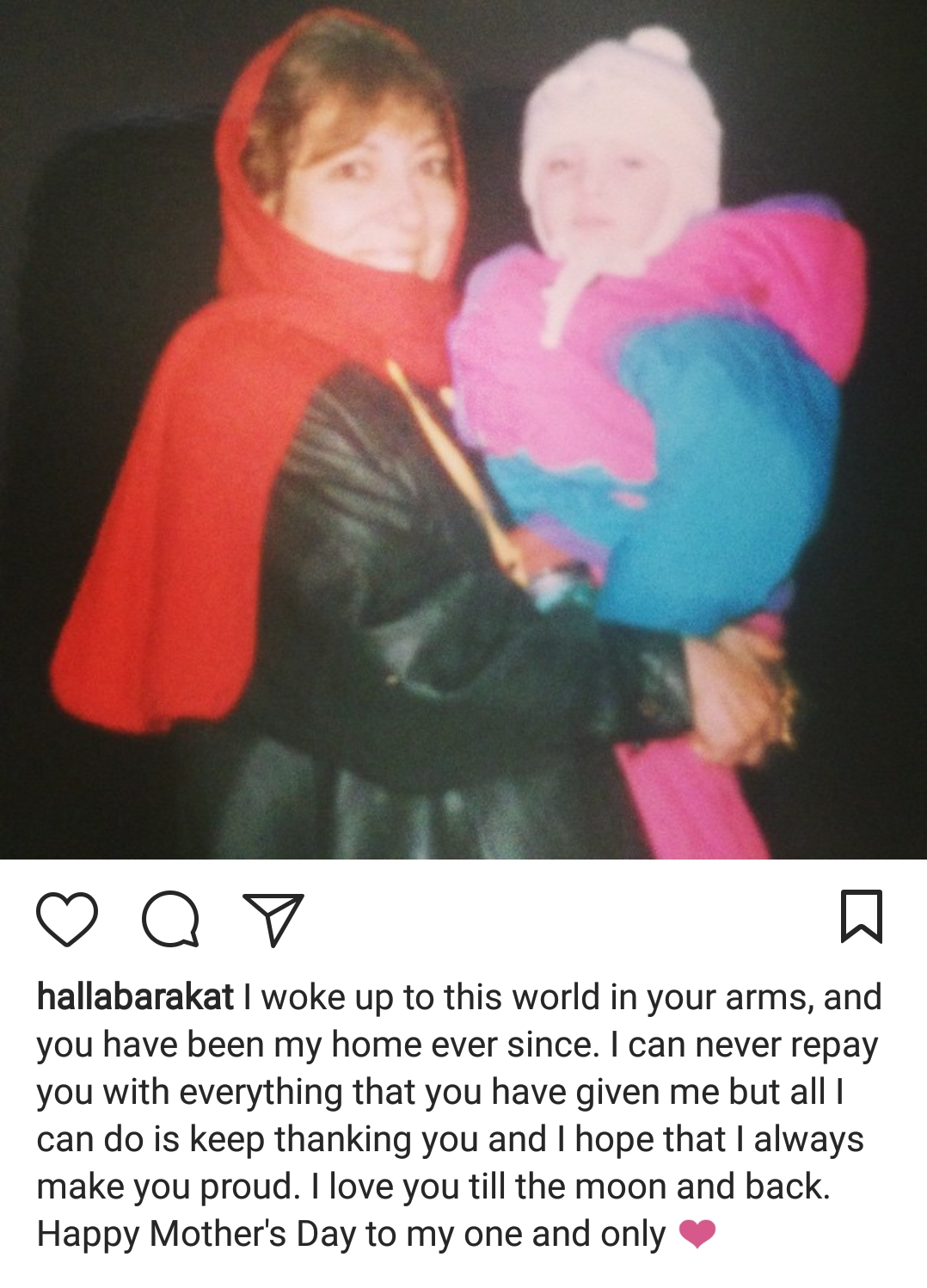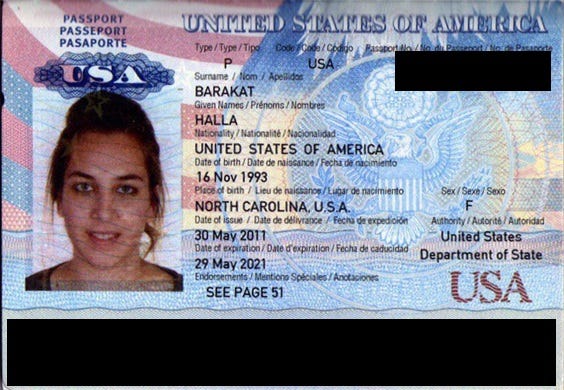
Report: Case of American journalist and Syrian mother murdered in Turkey botched
ERTAN KARPAZLI. September 20, 2018
An independent investigation into the murders of 23-year-old American journalist Halla Barakat and her Syrian activist mother Orouba Barakat, who were killed in their apartment in Istanbul last year, reveals a number of irregularities in the murder case which may have been deliberately botched due to political pressure.
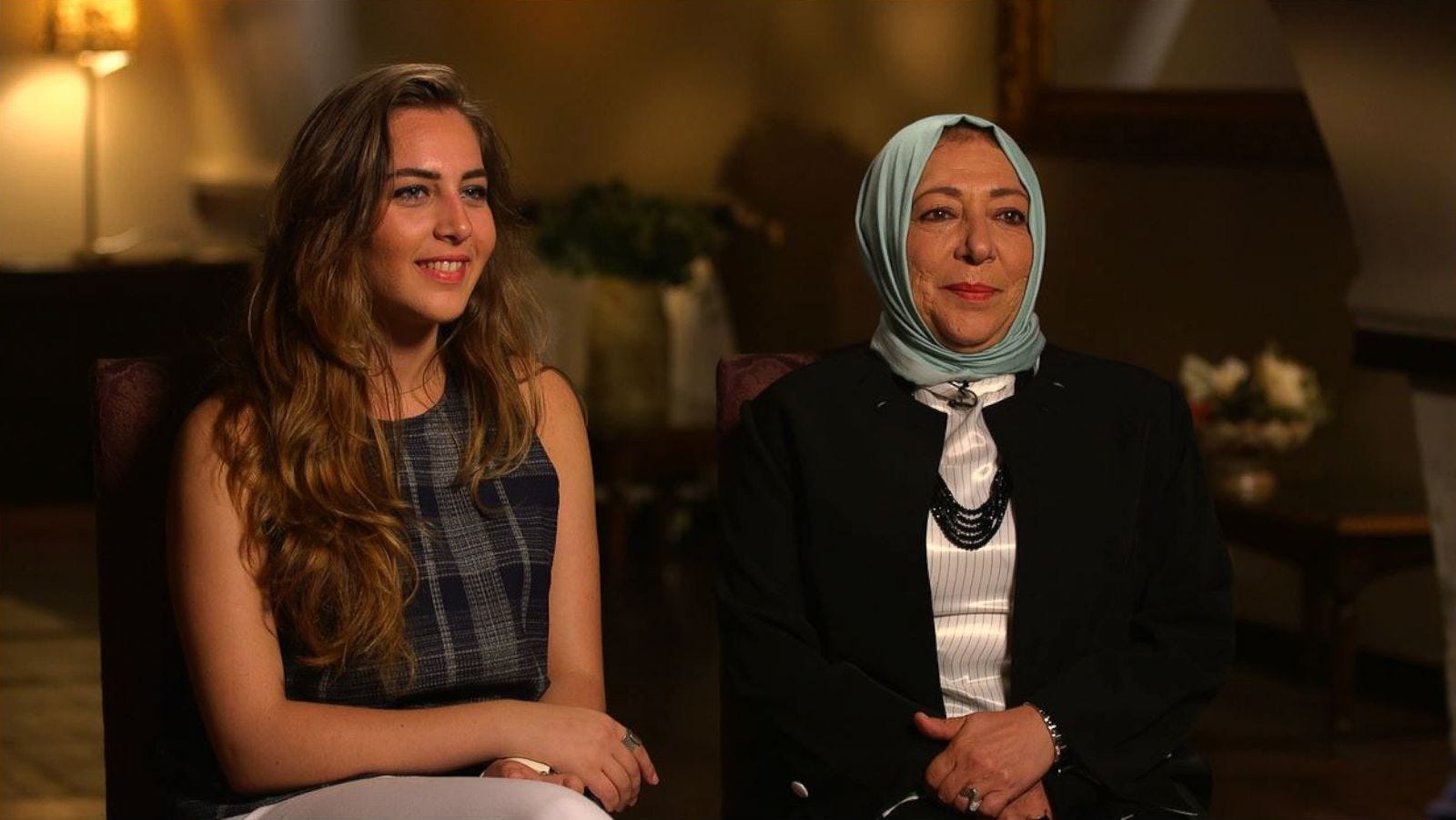
North Carolina-born American journalist Halla Barakat (L) and her Syrian activist mother Orouba Barakat (R).
Introduction
Exactly one year ago today — on the morning of September 20, 2017 — American journalist and rights activist Halla Barakat, 23, failed to arrive at her office in Istanbul. Her mother, 62-year-old Orouba, a lifelong critic of the Assad regime in her native Syria, also did not show up at the charity she was running in the city’s Fatih district. The following day, the women were found brutally murdered in their apartment in the Kucuksu neighborhood of the Uskudar district, where they had been residing for three years.
Halla and Orouba were both outspoken members of Istanbul’s Syrian community, so there were many possible motives being considered at the beginning of the investigation. No one claimed responsibility, but the first assumption for many people was that the Assad regime was behind the murders. Some suggested that ISIS or even the Al Qaeda-linked Nusra Front may have been responsible, but these groups typically claim responsibility even for acts they did not commit. A month prior to the murders, Orouba had also fallen out with the leadership of the Istanbul-based Syrian opposition, so that angle was also given thought.
In March 2018, however, a Turkish court convicted their distant relative Ahmed Barakat — the only suspect in the case — for their murders. The indictment against Ahmed, a former Syrian opposition fighter, made no mention of a motive. Ahmed himself said he had killed Orouba during a tussle over unpaid wages owed to him, and then killed Halla because she was screaming. He later retracted that statement, saying his translator had tricked him into making that confession. Nonetheless, a political motive was ruled out, and the media was quick to brush the story aside.
The verdict left many people who were close to the victims dissatisfied, as the case was plagued with countless irregularities, with some indications that it may have been deliberately botched. For one year now, I have been speaking to lawyers and friends and family members of the victims to highlight areas in the prosecutor’s report where it appears that the Turkish authorities were negligent in their handling of the case. I have had to lay low while conducting this research due to the sensitivity of the case and risks to my own well-being, which have unfortunately limited my ability to dig deeper.
Having exhausted my own resources, I sought the help of others to carry this probe further, but after many months of trying, I’ve come to terms with the sad reality that the few trustworthy people who are able to help in this regard are either unwilling or reluctant to do so for a variety of reasons. Therefore, I have decided to make my notes on the case public
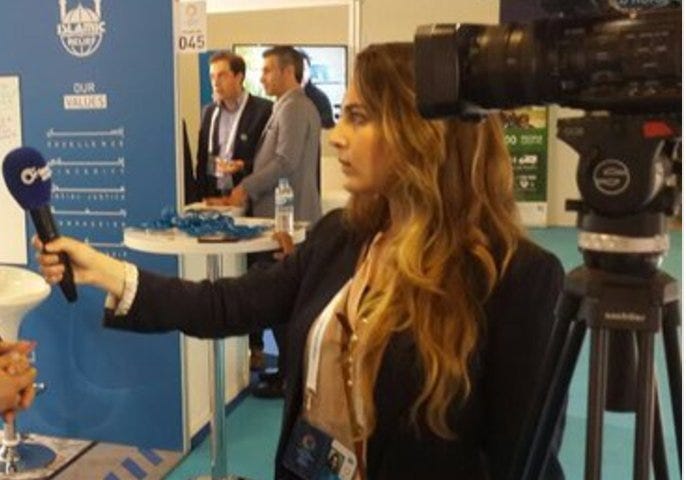
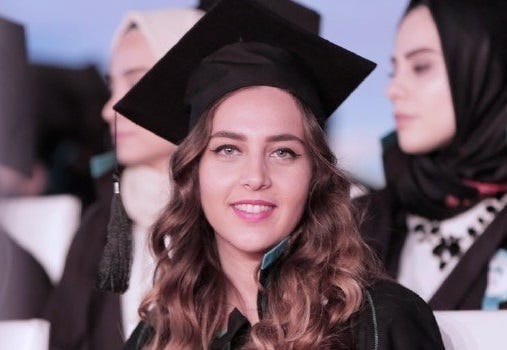
Halla Barakat had just left her job at Syrian opposition news channel Orient TV and graduated in the field of Political Science from Istanbul Sehir University some weeks prior to her death.
Aims and objectives
The conclusions of this report should not be taken as undisputed fact, and I am open to the possibility of being mistaken in certain areas, but I want my interpretation of what really happened to Halla and Orouba based on the information I was able to obtain to be seriously considered as an alternative, perhaps even more accurate explanation of events that I feel have not been properly explained in the prosecutor’s report.
My aim is not to challenge or overturn any legal decisions made in Turkey, but the issues brought up in this report may be utilized by whomsoever it concerns to re-open the case. Likewise, I do not wish to accuse any individuals involved in the Turkish legal or political systems of incompetence or take shots at their integrity, but if the relevant authorities deem fit, they may use this report as part of an internal or external investigation to identify and rectify weaknesses in those systems.
My sole objective is to make certain information related to the case public knowledge and insert it into the general narrative surrounding the tragic murders of these two innocent women. This is something I owe as a debt to them for their friendship and the only way I can continue to live with myself as a human being.
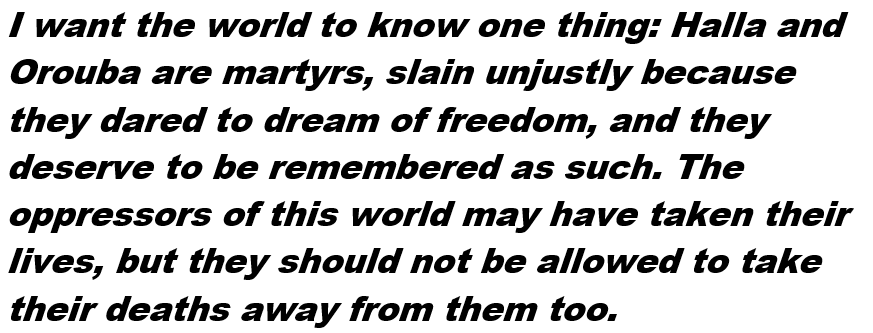
Disclaimer
I grant my permission for this report to be reproduced, in whole or in part, to whomsoever wishes to make use of it in whichever way they please provided that the report is properly referenced and any online content produced based on this report links back to this original source. This report is not for sale and should be free for public viewing.
I bear full responsibility for this report and any errors it may be found to contain. This report was completely produced on my own initiative and does not represent the policies or interests of any other individual or group. For legal and ethical reasons, I have either changed or withheld the names of some witnesses involved in the case.
Anyone wishing to contact me regarding this report should email me on ertan.karpaz@gmail.com. A PDF version of this report is available upon request.
How I knew Halla and Orouba
Halla Barakat was one of my dearest friends. We met in 2015 while she enjoyed a six-month stint at Okaliptus Medya, a private company which was at the time being outsourced by Turkey’s state-run English-language public broadcaster TRT World. It was her first official job as a journalist, but she had already been exposed to the profession through her mother, who at the pinnacle of her career as a journalist had once interviewed former Turkish president Turgut Ozal. In an office environment at least, one could say I was Halla’s first journalism mentor. Halla and I went on to develop a strong personal bond, and through her I later met her mother Orouba, who welcomed and treated me as if I was her own son.
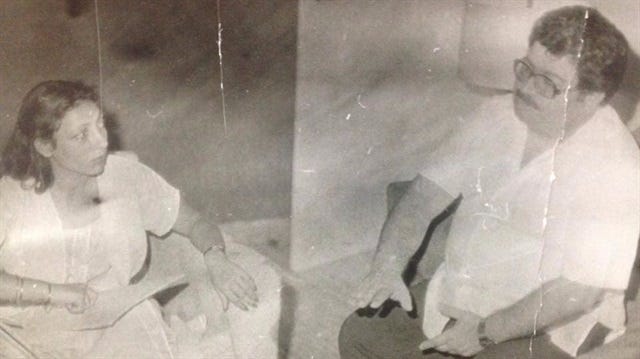
Orouba Barakat interviewing the late former Turkish president Turgut Ozal.
I noticed that as popular as they were among the Syrian community, they were also very much alone. Halla had been estranged from her father since she was an infant and was an only child brought up by a single mother. Throughout their lives they had to face and overcome the many obstacles a mother and daughter typically come across in patriarchal societies. Thankfully, they did have a few good people around to help out when they needed it, but they were often too proud to tell others about their problems, particularly their financial struggles, and preferred not to depend on the kindness of others.
Neither of the two women were legally entitled to work in Turkey. Halla, who due to being born in North Carolina held US citizenship, was living in Turkey on a student visa, which had just expired in the summer of 2017 when she graduated. Through her unofficial, underpaid part-time work, Halla was the main breadwinner in the household, often earning barely enough to cover the rent.

Halla Barakat was born in the US state of North Carolina in 1993 and was a proud American.
Orouba, meanwhile, only held Syrian citizenship and was therefore designated by the Turkish government as a “guest” — a friendly term granting her the right to stay in Turkey indefinitely that fell short of granting her any legal status or the right to work. Although Syrians in Turkey were later granted work permits, Orouba mainly got by through running workshops aimed at empowering refugee women in Istanbul, as well as the money she acquired when she sold her advertising business in the United Arab Emirates shortly before she and Halla moved to Turkey in 2013. That money, however, was fast running out. Where it mattered, all they really had was each other, but of course they appreciated all the help they could get.
I still remember when Orouba almost cried out of gratitude when I helped her briefly land a job at TRT Arabic. At the time of her death, Halla was also in the process of applying to return to TRT World, which had since annexed Okaliptus Medya and its staff. She was not happy working at Orient TV, the Istanbul-based Syrian opposition’s main news channel, where she felt her efforts were being overlooked. In early 2017, she completed an internship at ABC News in New York, having the year earlier featured alongside her mother in an investigative documentary for the same channel about their family friend, American activist Kayla Mueller, who was killed while in ISIS captivity in Syria back in 2015.

Orouba Barakat and Halla Barakat walk with ABC News journalist Brian Ross as they shoot a documentary in Istanbul about killed ISIS captive Kayla Mueller.
Both Halla and Orouba had campaigned rigorously for Mueller’s release while she was being held hostage, and thus became open to threats from ISIS in addition to the threats they had already been receiving from Assad regime supporters since the beginning of the war in Syria in 2011. However, the threats and upsetting messages they received, mainly over social media, had become a general part of their lives which they learned to live with. These threats were common knowledge to close friends and family members, but the two women never mentioned receiving any specific or direct threats. Frankly speaking, their enemies had bigger fish to fry, so no one expected that any of these threats would one day be implemented.
Halla and Orouba found dead
On September 21, 2017, three of Halla’s concerned classmates went to check up on her at her apartment in the Kucuksu neighborhood of Istanbul’s Uskudar district. It had been two days since anybody had heard from either Halla or her mother. I spoke to one of those witnesses, who I will call Maria. Maria told me that when they arrived at the victims’ home, they found Orouba’s car parked in its regular spot outside the apartment on Yangac Sokak (Street), and from outside they could see the lights were on even though it was daytime. After knocking on the door a number of times and getting no response, they decided to call the police.
With the help of a local locksmith, two responding police officers managed to pry open the door, which was not locked from the inside. As soon as the door opened, they were hit by an overpowering smell of lime. It was then that they saw it. The bodies of two women — Halla and Orouba — laying side by side in the lobby of their home a few meters from the entrance. They were covered in curtains and blankets, with only their blood-soaked legs visible from under the covers. White detergent was sprinkled all over the apartment, seemingly in an attempt to cover up the smell of the blood.
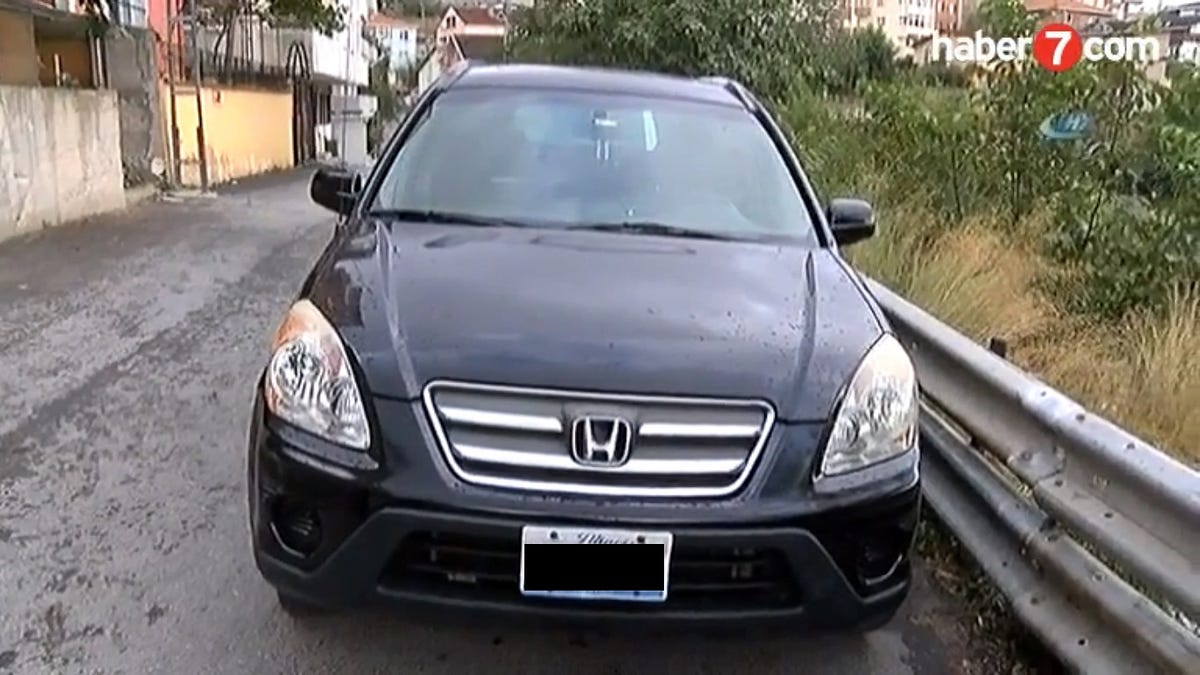
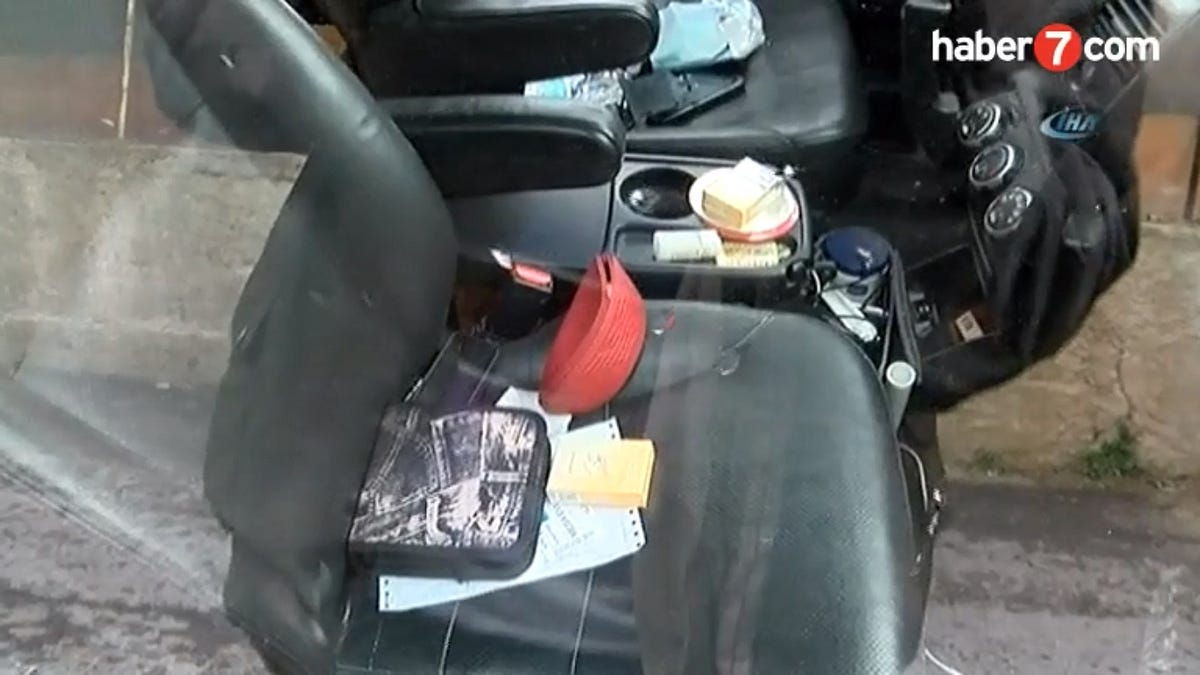
Orouba Barakat’s car and its interior. The car was found locked in its usual parking spot outside of the victims’ home on Yangac Sokak in the Kucuksu neighborhood of Istanbul’s Uskudar disctrict
The police immediately pushed back onlookers. Halla’s uncle and Orouba’s brother, Maen, arrived at the scene after the building had already been sealed off. Police would not let him approach the building, and were not revealing any information whatsoever. It was only when the Turkish daily Yeni Safakbroke the news on its website just after midnight on September 22 that Maen found out his sister and niece had been murdered. The initial story in Yeni Safak, which is known to have close ties to the Turkish security and intelligence services, used a word which could be translated into strangled, suffocated or choked when describing the murders. An article released by the newspaper the following day, however, said the victims’ throats had been cut.
Halla’s friends were foreign students, and only Maria knew enough Turkish to effectively communicate with the officers. The two who did not speak Turkish were told to wait outside, having only caught a quick glimpse of the crime scene. But Maria, who was the only civilian given access to the apartment, was told to stand at the front door and translate instructions while the police established a cordon. From where she was standing, Maria said she saw no evidence of struggle. The ironing board, just to the left of the entrance, was open and the iron was upright. Clothes on the ironing board had been left neatly folded, as if someone had been ironing just before the murders took place.
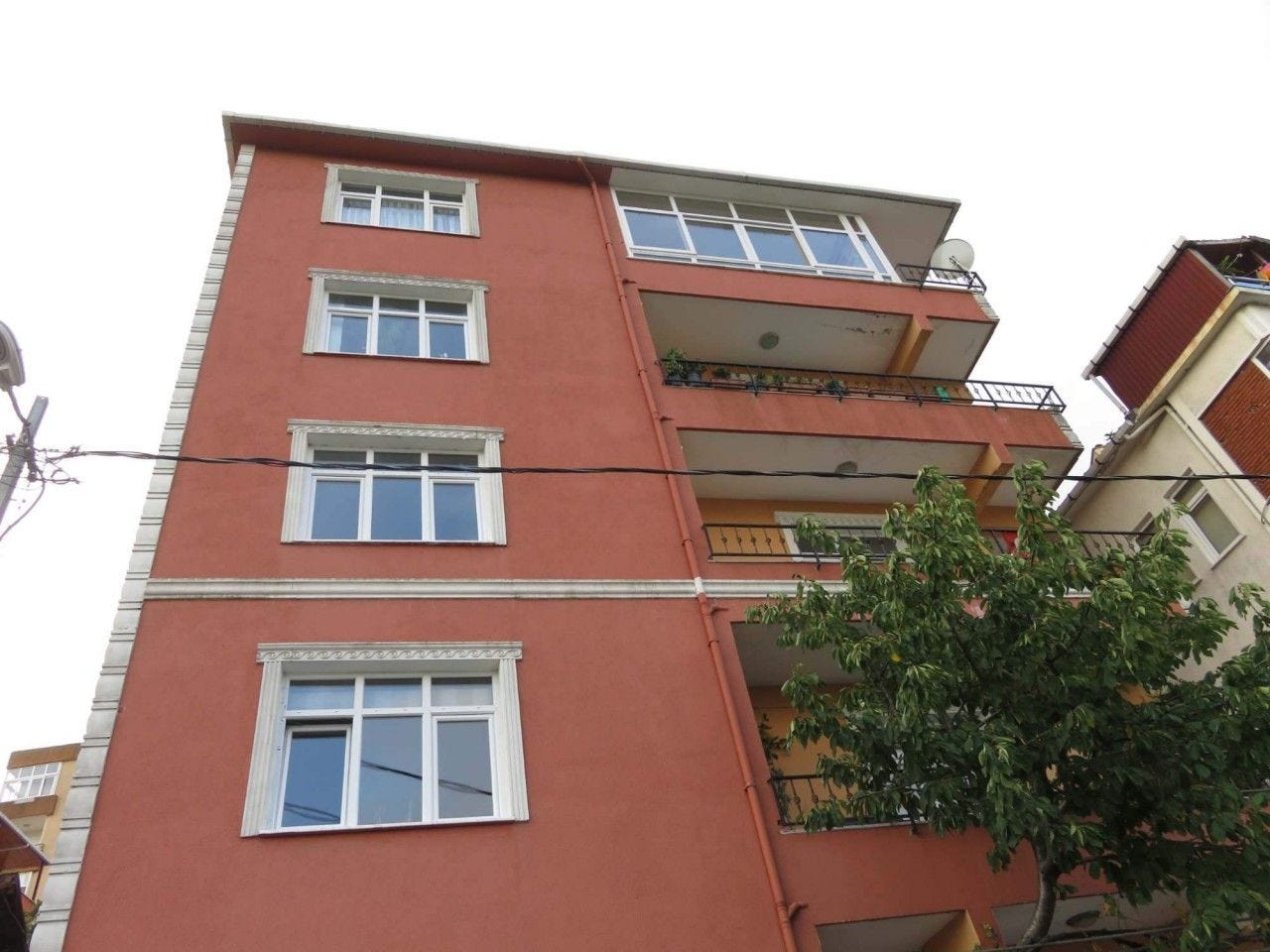
Halla and Orouba Barakat lived in this apartment block on Yangac Sokak in the Kucuksu neighborhood of Istanbul’s Uskudar district.
I have been told that the other two friends who were with Maria have not spoken about what they saw to anyone else since that day. One did not respond to my request to speak to him, while I was told the other was too frightened to come forward. Maria told me the latter witness, who is of Syrian background, received a phone call from a withheld number the following day. When he answered the call, nobody spoke and he heard heavy breathing coming from the other end of the line.
The crime scene
Shaza, Halla’s aunt and Orouba’s sister, told me that police gave the family access to the apartment three weeks after the murders took place. She confirmed Maria’s account of the ironing board being open and the iron being upright, with clothes folded neatly. She also said that Halla’s underwear was among a pile of recently washed, neatly folded laundry, which leads her to believe there were no male guests in the apartment due to both women holding relatively conservative values.
I also saw a picture of the crime scene in the prosecutor’s report taken from the entrance of the apartment, before the bodies were removed. The ironing board, iron and clothes were indeed as witnesses said they were, so it is unlikely that any kind of struggle took place near the front door. Both Shaza and the prosecutor’s report confirm there were no signs of forced entry, whether from the front door or elsewhere.
There were, however, indications that a small struggle took place in the kitchen. Shaza told me she found a piece of glass belonging to a broken blender inside the kitchen, which had been left behind by investigators. The wires of the electricity socket near the blender had been completely pulled out. Shaza thinks the blender may have been used as a weapon during the incident, perhaps by one of the victims in self-defense. A victim may have grabbed the blender while it was still plugged in, and pulled on it rapidly, forcing the wires to come out of the socket
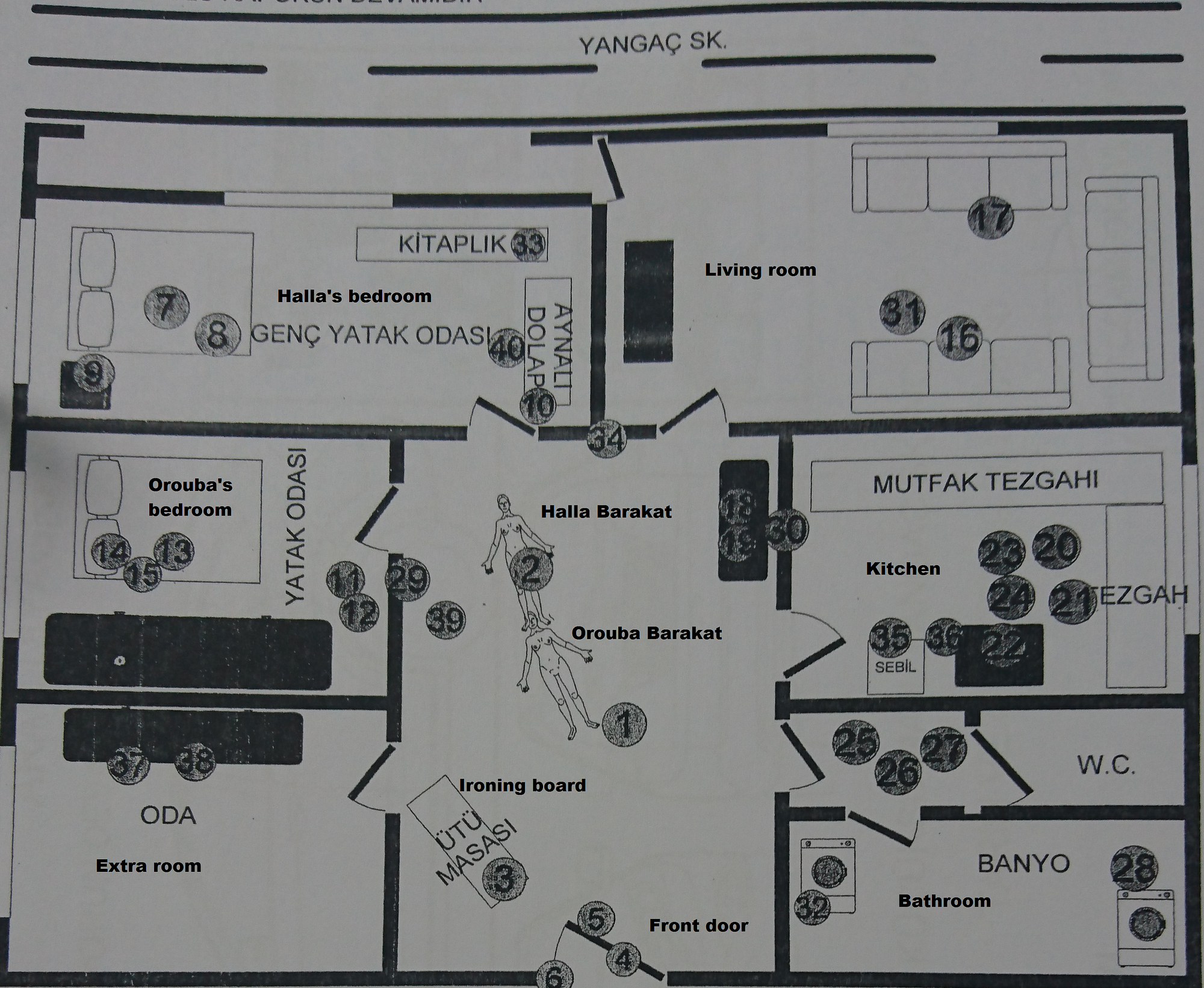
Halla and Orouba Barakat were found dead side by side in the lobby of their apartment, but blood spatter suggests one of them was killed in the kitchen
Based on Shaza’s eyewitness account of the crime scene and the blood spatter analysis in the prosecutor’s report, we can conclude that one of the murders took place in the kitchen, where blood was found sprayed across the fridge and a mass amount of it was present on the floor. Marks on the floor also suggest that the body of the victim killed in the kitchen was dragged into the lobby. Blood was also found sprayed across the mirror in the far-right corner of the lobby between the entrances to the living room and the kitchen, so one of the murders is likely to have been committed there. In other words, the two victims were separated from each other when they were killed and their bodies were placed next to each other later.
According to the prosecutor’s report, Halla was clothed, wearing a bathrobe on top of her pajamas, but the bathrobe was found crumpled up near her chest area, which could have occurred as she was being dragged across the floor. Therefore, I believe Halla was the victim murdered in the kitchen. Orouba, who usually wore a traditional abaya and headscarf in the presence of men, was just wearing her nightgown, which suggests she was not with any expected male visitors when she was killed. Furthermore, Orouba’s bed was not made, so she may have been sleeping when intruders entered the home.
Shaza added that some key pieces of evidence were also left behind by the forensics team. She said she found a piece of cloth which had blood stains on it matching the shape of her sister’s nose and mouth. Police also left behind an empty detergent bag, possibly for the detergent that was poured around the apartment, which may have had fingerprints on it. Shaza said that when she presented these items to the police, they were dismissed and told they were not important
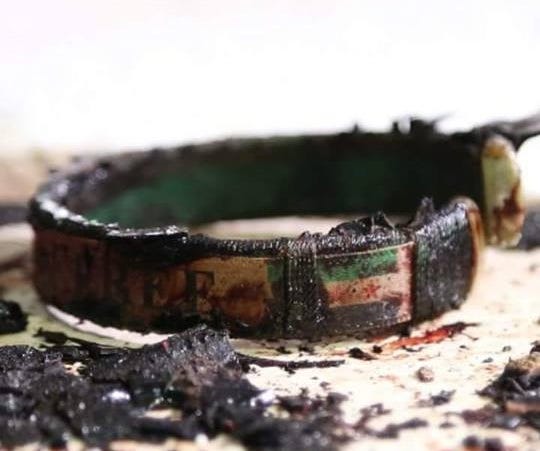
Halla Barakat’s “Free Syria” bracelet was left at the crime scene covered in blood. This photo was taken by her relatives after they were given access to the apartment.
Last contact
A frantic effort began to trace back when the two women were last seen and heard from. A friend of Orouba, who I will call Adnan, had visited her at her workplace on the evening of September 19. Adnan said that all the other staff in the building had left by 18:45, when he himself left. Orouba told Adnan she would stay behind for another hour or so.
According to documents in the prosecutor’s report, at precisely 20:53 local time, records show that Halla and Orouba spoke to each other on the phone while they were in the vicinity of Orouba’s workplace in Istanbul’s Fatih district. Halla later spoke over the phone for about a minute to a friend, who I will call Sadiq, that evening at around 21:30. Signals picked up by the nearest telephone mast to Halla indicated she was at home in Uskudar. In his statement to police, Sadiq said Halla told him she had just got home and was tired. She made no mention of any visitors. This was the last confirmed contact anyone had with either of the two women.
After the bodies were discovered, Sadiq told the police he overheard some of Halla’s friends saying that one of her colleagues told them she had informed her office on the morning of September 20 that she would not be coming to work because her mother had received threats. Sadiq provided the first name of that colleague, but police made no effort to verify this information despite its obvious significance. I too was not able to verify if this exchange took place, but this could have been the last contact anyone had with Halla. This information would have been vital in narrowing down the time frame within which the murders were committed.
The last unconfirmed contact anyone had with Orouba was said to be at 03:00 on September 20 over WhatsApp. Sadiq told police that one of Orouba’s friends received a message from her at that time and published a screenshot of the message on to Orouba’s Facebook page shortly after news of the murders broke. I could not verify this information, but the individual who was said to be the recipient of that message was not contacted by the police. Investigators also made no effort to check the victims’ WhatsApp messages or interactions on any other online messaging platform.
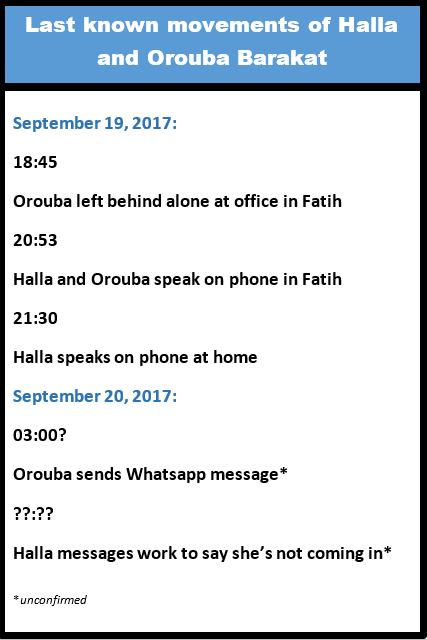
The prosecutor’s report only included the statement of one neighbor, whose testimony was not very helpful. None of the neighbors that friends and family of the victims have spoken to heard anything or noticed anything untoward other than the light being left on and a coffee mug that had been left on the edge of the balcony. I must note that the Kucuksu neighborhood is a quiet, residential area far from any main road. It would have been almost impossible for no one to hear a scream, especially in the hours the murders are believed to have been committed.
Autopsies
The bodies were removed from the apartment in the early hours of September 22 and taken immediately for an autopsy, which was completed within a day.
According to the autopsy report, Halla suffered in total 11 wounds, including nine stab/cut wounds and two cuts. Four of the nine stab/cut wounds were potentially fatal alone, and one of the two cuts were potentially fatal alone. Doctors pinpointed the cause of Halla’s death to excessive bleeding due to a severed jugular vein and cut internal organs.
Orouba, meanwhile, was found to have a total of 18 wounds, including 14 stab/cut wounds and four cuts. Eight of the stab/cut wounds were potentially fatal either alone or combined. She was also ruled to have died from excessive bleeding due to a severed jugular vein. Doctors further noted that Orouba was suffering from fractured ribs caused by blunt trauma, but I later confirmed through Orouba’s sister Shaza that this was an old injury.
However, Shaza, who told me she washed the bodies of the victims before burial, denies the victims had suffered multiple stab and cut injuries. She said both women had only suffered cut throats, and there were no other wounds on their bodies. This indicates that as opposed to the victims dying in a frenzied, spontaneous attack driven by emotion, their murders may have been a calculated execution and carried out professionally.
Shaza also said that both of the bodies were covered in bruises. Although discoloration of the skin is a common occurrence after death, Shaza was adamant that this was not normal, because both women had the same pattern of discoloration on their bodies. The outer arms of both Halla and Orouba were severely bruised, suggesting to Shaza that they may have been grabbed or squeezed on the sides. To add, Shaza said that the nose and mouth area of both women had turned a deep blue color, as if some kind of liquid or chemical had been pressed against their faces and absorbed into the skin. None of this was mentioned in the autopsy report.
One more downfall of the forensics and autopsy process was that blood samples were not taken from inside the wounds of the victims. If the two victims had been killed using the same weapon, then blood samples taken from their wounds may have found the DNA of the first victim in the wounds of the second victim. Had these samples been taken and displayed no evidence of DNA mixing, findings would indicate that the women were killed with two different weapons and increase the likelihood of there being more than one suspect.
Suspect profile
On September 23, Halla and Orouba were buried in Istanbul. The man who would later be convicted for their murders, distant relative Ahmed Barakat, was at the funeral. He had arrived in Istanbul that day from Bursa, where he had spent most of his time since arriving in Turkey from Syria in early 2017. The 21-year-old ex-opposition fighter had spent the previous six years of his life in his war-torn homeland with his family in Damascus.
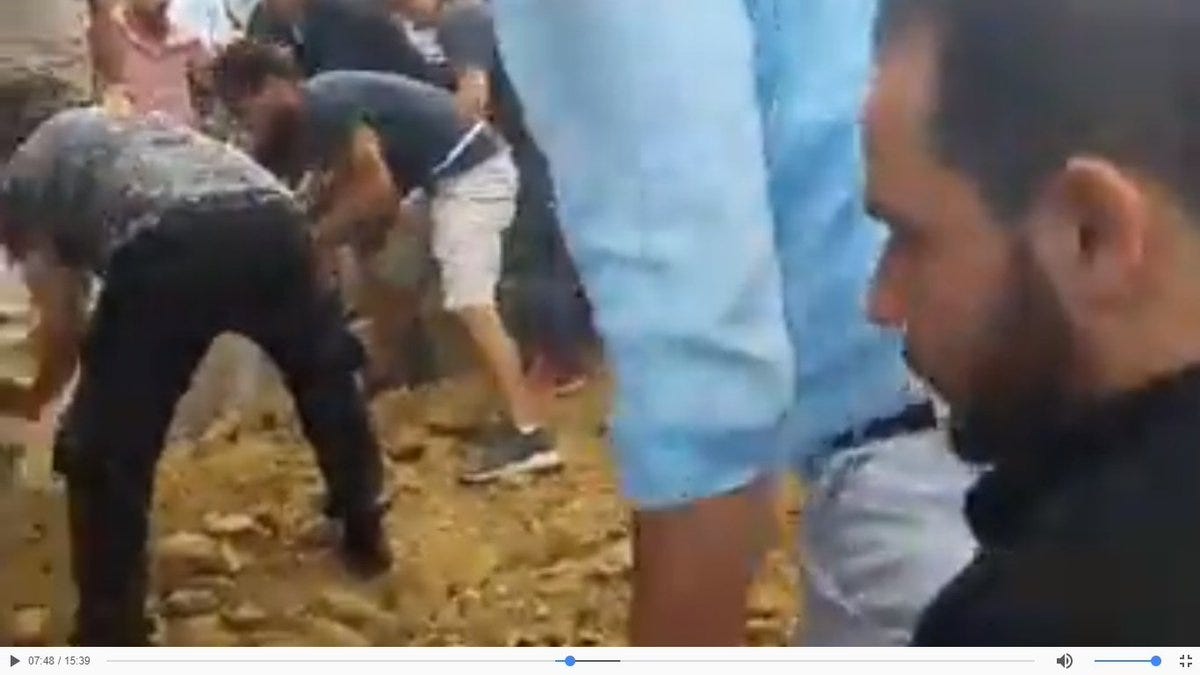
Ahmed Barakat (right) captured in video at the burial of his relatives Halla and Orouba Barakat.
According to his own statement to a Turkish court, he had only taken up arms for a brigade affiliated with the Free Syrian Army (FSA) for about a year before coming to Turkey. He was based in the rebel-held Damascus suburb of Wadi Barada and was part of the group that briefly cut off the water supply to the Syrian capital before the besieged enclave was overrun by regime forces. He was evacuated to the opposition stronghold of Idlib under a deal agreed with the regime.
Ahmed had never met the victims in person before moving briefly to Istanbul. He was the grandson of Orouba’s uncle. Shaza told me she had only ever met him once when he was a child. His father had died of cancer before the war and he was being raised by his single mother along with his older brother and two sisters in Damascus. They were very poor, so the entire family, including Orouba, would chip in to help them get by.
Ahmed’s mother is an Alawite, belonging to the same religious sect as Syrian regime leader Bashar al Assad and the upper echelons of his faction. His mother’s brother fought for the Shabiha, a paramilitary group which supports the Assad regime. Even though it was well-known that Orouba and Halla were often the target of threats from regime supporters, Ahmed’s personal ties to the regime were not mentioned anywhere in the prosecutor’s report.
After his capture on September 30, an anonymous source told Huffington Post Arabic that Ahmed was responsible for his own brother’s death in Syria. Ahmed had told the court that his brother had been killed by the regime, but Shaza informed me that Ahmed had actually shot his brother dead during a quarrel. Ahmed’s immediate family initially told relatives his brother had died as a result of an accident. Shaza said Ahmed’s family later admitted to her that Ahmed had killed his brother, but she was not sure if the killing was intentional or accidental. However, she suspects the incident may have occurred during an argument over finances because Ahmed’s older brother was planning to marry and was therefore holding onto money which Ahmed was hoping to use to marry his own long-term girlfriend in Damascus. Another account said that Ahmed’s brother was beating his mother, and Ahmed killed his brother while defending her.
Relationship with victims
After Ahmed left Damascus, Shaza offered her own home in Idlib to house him. It was while he was staying in Idlib, in the safety and security of a de-escalation zone controlled by the opposition and all the family support he needed, that Ahmed decided to go to Turkey. Ahmed got in touch with Orouba over Facebook and asked if he could stay with her in Istanbul, he told the court. Orouba mentioned her brother Maen, who was also living in Istanbul, and said he could stay with him.
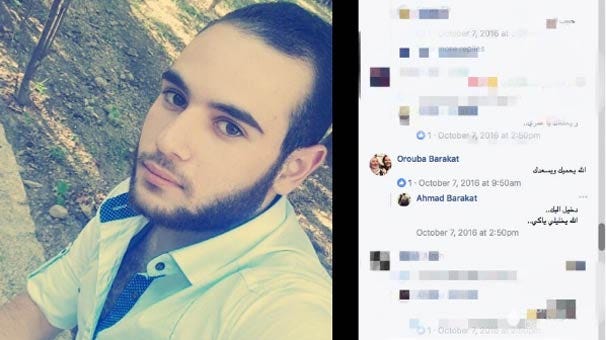
A screenshot taken from Ahmed Barakat’s Facebook under which Orouba Barakat wrote a comment.
Ahmed finally crossed into Turkey at the beginning of 2017, but it was many months before he made it to Istanbul. Quoting Ahmed, Maen told me he first stayed in Mersin before he went to Bursa where he was staying with friends. Ahmed, in his statement to the court, said he entered Turkey through Hatay and got on a bus to Bursa on invitation of a man who he only knew as “Abu Arab”. Ahmed’s brother-in-law in Syria gave him Abu Arab’s phone number and told him to call him. When Ahmed arrived in Bursa, Abu Arab gave him a sim card, let him stay at his home for around two weeks and found him a cleaning job in a nearby school. Ahmed said he later moved into an apartment with some other Syrian men he met at a barber shop.
Ahmed said he never found out Abu Arab’s real name, but believes the sim card given to him, which was issued on February 16, 2017, was registered under his real name. The identity of the person to whom the subscription belongs is found in the report, but I will not reveal this name as I do not want to inadvertently endanger any potential witnesses. Unfortunately, however, very little information is made available about this person, who we can only assume is Abu Arab. The police also did not approach this person for a statement.
Having lived in Bursa for a number of months, Ahmed arrived in Istanbul in the summer of 2017. His statement to the court matches the accounts of his relatives Maen and Shaza, who say that he only stayed in Istanbul for around a month. Orouba gave Ahmed a job in the charity she had set up, but he worked there for just over three weeks before leaving to work a better paying job in Bursa.
During his time in Istanbul, he mainly stayed with Maen, but visited Orouba on a few occasions and would stay the night at her place when he did. Both Shaza and Maen said there were no problems between Ahmed and Orouba, or Halla for that matter, and he departed Istanbul on good terms with them. Police investigations presented in the prosecutor’s report showed that Ahmed and Orouba had been in touch via telephone as recently as August 24, 2017, under one month before the murders.
Maen, who shared an apartment with Ahmed during most of his stay in Istanbul, did not take a liking to the young man and insists that he was a drug abuser. He also pointed out that Ahmed was extremely lazy, yet he always had enough money for cigarettes and other luxuries. Nonetheless, neither Shaza nor Maen suspected that Ahmed had anything to do with the murders till after the funeral.
Suspicion raised
The day after the funeral, a family friend in Germany called Shaza to express his concerns about “a young man” who was working for Orouba’s charity. The caller did not know the name of this young man, but mentioned that an Iraqi refugee family he once helped settle in Istanbul and was being supported by Orouba’s charity had complained that this individual stole a portion of some money that he was supposed to deliver to them.
Not aware the caller was referring to Ahmed, who was at the time sitting in their presence, Shaza asked Maen who the young man could possibly be. Maen identified him as Ahmed, upon which Ahmed raised his voice in anger and spoke ill of Orouba. Shaza, who mentioned that Ahmed was wearing a t-shirt that day and did not appear to have any scratches on his body, then gave his name to the police on a whim, but did not expect what was to come next.
Turkish police detained Ahmed after he appeared on security camera footagewalking towards the home of the victims on the night of September 19. Footage shows he took the last 15S bus from central Uskudar at 23:14. The cameras on the bus froze at 23:37, so we do not know exactly where Ahmed got off, but we can assume he got off at the Mete Sokak stop, which is as close as that bus goes to the victims’ home.
The Baydarli Alyan Pirlanta jewelry store’s security cameras show Ahmed walking on Kaldirim Caddesi at 23:41 towards Atabek Caddesi. Police took the footage of this camera between the period of 23:00 on September 19 and 12:00 on September 20, coincidentally close to the same times Ahmed walked past them
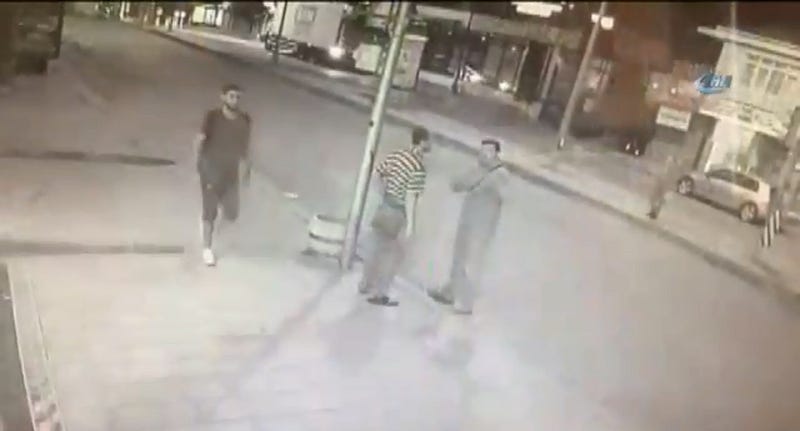
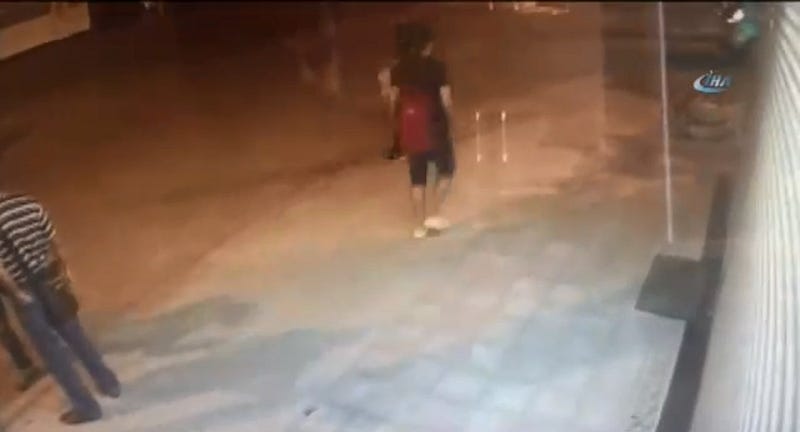
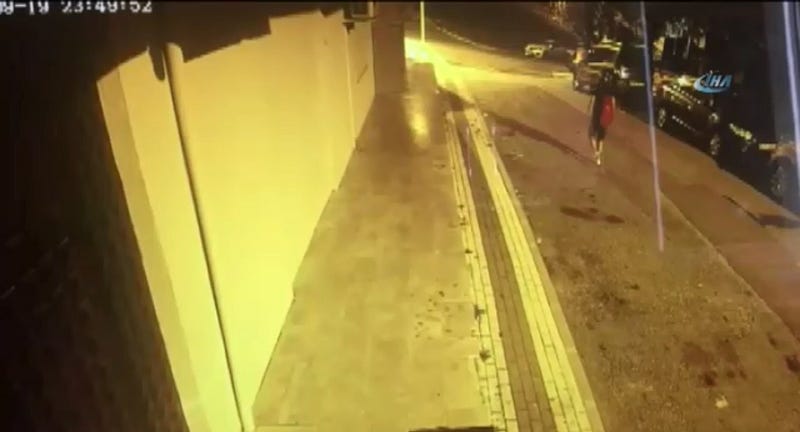
Ahmed Barakat seen walking to the home of victims Halla and Orouba Barakat just before midnight on September 19, 2017 in Uskudar, Istanbul.
Security camera footage taken from the BIM supermarket on Ozturk Sokak shows Ahmed walking past at 23:49, some eight minutes after his previous sighting. I’d like to underline that the walking time between the jewelry store and the supermarket is typically two minutes and there is no other shop in between these two points, yet for some unexplained reason Ahmed took up to six minutes longer than usual. Ahmed is then seen turning left towards Islam Sokak. Police took the footage of this camera between the period of 23:00 on September 19 and 12:00 on September 20, again disregarding any activity before and after the time frame Ahmed entered and exited the area.
He was spotted once more by the nearest known camera to the crime scene walking past the Avsar Market (DEPO) on Millet Caddesi at 23:50, and did not re-emerge until the same camera captured him at 11:40 the next morning, walking in the opposite direction while wearing a different set of clothes. Even his shoes were different. He is also seen carrying a black BOSS bag, which he later dumps somewhere between the BIM supermarket on Ozturk Sokak and the Baydarli Alyan Pirlanta jewelry store on Kaldirim Caddesi before jumping into a taxi and leaving the area. The distance between the supermarket and the jewelry store was this time covered in two minutes, between 11:42 and 11:44, instead of the eight minutes it took the night before. The fact that Ahmed didn’t spend time deliberating on where to hide potentially incriminating evidence as he left the area suggests to me that he had already figured out precisely where to leave his bag and make a quick getaway
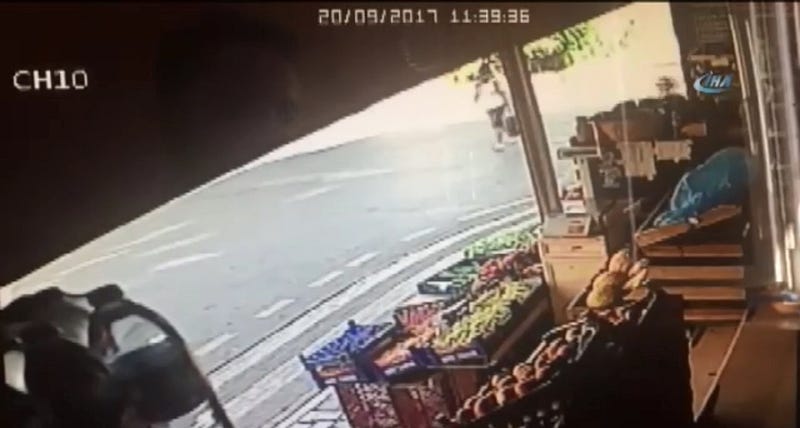
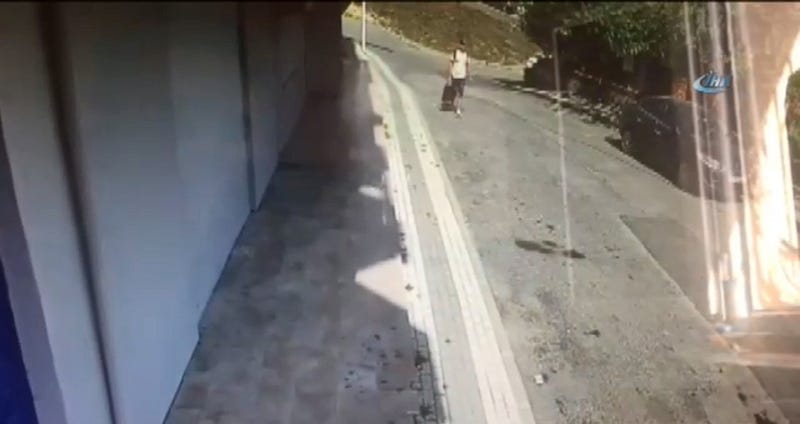
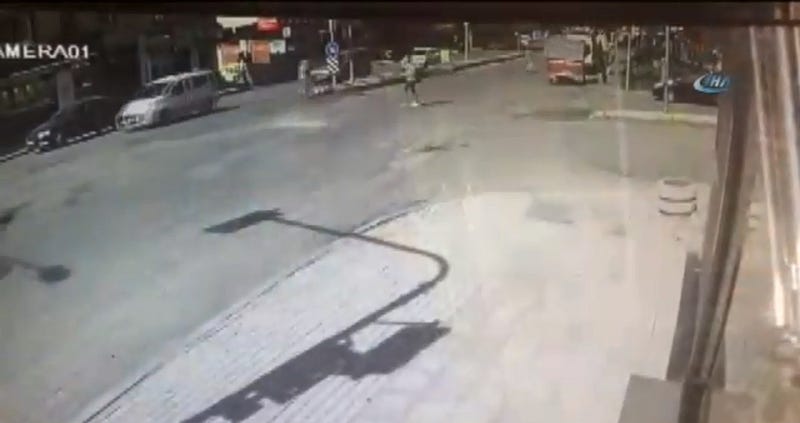
Ahmed Barakat spent almost 12 hours in the vicinity of the home of Halla and Orouba Barakat before being seen leaving the area just before midday on September 20, 2017 wearing a different set of clothes. Note the black bag in the first two stills is absent in the third
In his statement, Ahmed did not deny being the man in the camera footage, but he insisted that he had no contact with the victims that night. He told the court he had arrived at the home of the victims but did not find them there, so he left and slept rough in a nearby park, after which he said he changed his clothes before returning to the victims’ address, and then left once again when he did not get an answer at the door. He said the BOSS bag contained the clothes he had been wearing previously, and he threw it away because the clothes were dirty. Although the precise area Ahmed dumped the bag is known, the bag was never found.
After tapping his phone and following him for three days, Turkish police finally detained Ahmed on September 30 at his home in Bursa
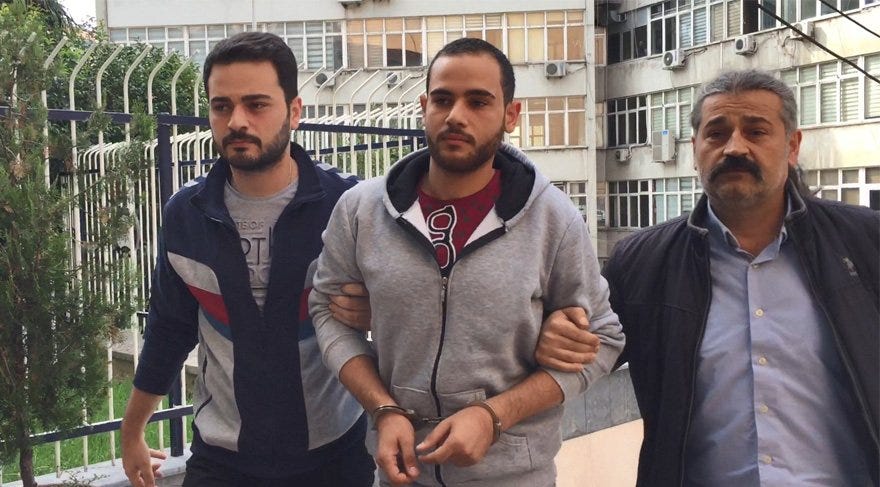
Ahmed Barakat was detained in connection to the murders of Halla and Orouba Barakat on September 30, 2017 at his home in Bursa, Turkey.
More suspects at large
The case was immediately shrouded in secrecy, and attempts of journalists and even family members to get any information from the police chief in charge of the case, Remzi Birinci, were unfruitful. Yeni Safak newspaper, however, got hold of a few leaks.
Early reports were saying that police were looking for as many as three suspects, meaning Ahmed was not alone. Shaza also said that police initially told the family that investigators had found at least three sets of footprints in the apartment. Noting that Orouba would never allow any of her guests into her home with their shoes on, Shaza is of the opinion that Ahmed was simply used to help the real killers gain access to the apartment. She believes that the victims opened the door for Ahmed before being rushed by intruders who entered thereafter. Maen, as well as many others who knew Halla and Orouba, also does not believe a physically weak young man like Ahmed could have possibly overpowered the two women at the same time without help
When questioned by police, Ahmed initially denied any involvement in the murders, providing the aforementioned explanation. Days later, however, forensics tests revealed that Ahmed’s DNA had been found under the fingernail of Orouba, upon which a prosecutor ordered his arrest. I must remind here that the autopsy that had taken place a week earlier revealed no foreign DNA under the fingernails of either victim, and point out that neither the people who saw Ahmed in the days following the murders nor doctors who conducted his medical check up when he was first detained noted any fresh scars on his body.
Besides the camera footage of Ahmed walking to and away from the scene at the time the crime was most likely committed, the DNA under Orouba’s fingernail is the only hard evidence that came up throughout the case to incriminate him. From this point onward, talk of there being more than one killer was dismissed and the entire case was built around the hypothesis that Ahmed was the only suspect
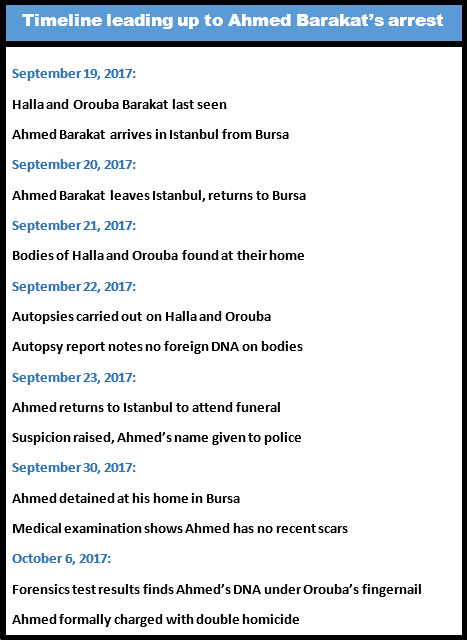
Confession
Ahmed went on to confess to the murders, saying he stayed the night at the victims’ home before getting into an argument with Orouba in the morning about unpaid wages. He said he killed Orouba with a knife during a tussle while Halla was in the bathroom. Halla then came out to see her mother covered in blood on the floor and started screaming. Ahmed said he told Halla to stop screaming, but she didn’t, so he killed her too.
This confession provided the basis for the final indictment against Ahmed, which also said he stayed the night at the apartment but does not identify a motive for the murders. The indictment also fails to address the lack of any other incriminating evidence at the crime scene besides the DNA under Orouba’s fingernail. It does not acknowledge the unlikelihood of somebody staying the night somewhere and not leaving behind any fingerprints, saliva or hair — none of which were found in the apartment except for those belonging to the victims.
Needless to say, in his final court appearance before the verdict, Ahmed changed his plea and reverted back to his previous story. He said his translator, who for legal reasons I will not name, encouraged him to plead guilty for a lighter sentence. He added that the Iraqi-born translator had actually made up part of his confession.
However, there were also many contradictions in Ahmed’s alibi. He failed to provide a believable explanation as to why he had traveled from Bursa to Istanbul on September 19, and why he was unable to inform anybody of his plans.
Data taken from Ahmed’s Istanbul travel card usage history shows that he arrived in Istanbul’s Fatih district at noon on that day and headed toward the home of the victims at a time he knew they would most likely both be at work. While no camera footage of this particular journey was provided anywhere in the prosecutor’s report, his travel card data suggests he loitered around the home of the victims for a short time before leaving from the nearest bus stop at 13:43 back toward Fatih. After 14:40, Ahmed went off the grid until 22:56 when he used his travel card to board a subway train in Fatih, on his way back to the home of the victims.
He claims he spent his time off grid waiting in Fatih, and was unable to call anybody because his phone battery had died. This contradicts evidence I came across while analyzing camera footage of Ahmed’s movements in Istanbul on September 19. In the photo still below, one can clearly see the glow of a screen from what appears to be a handheld communications device reflecting off Ahmed’s black t-shirt while he was looking at it. The image does not show a time but I believe it was taken either shortly after his arrival in Istanbul at noon of that day, or while he was on the way to the victims’ home later that evening. This still was strangely omitted from the prosecutor’s report
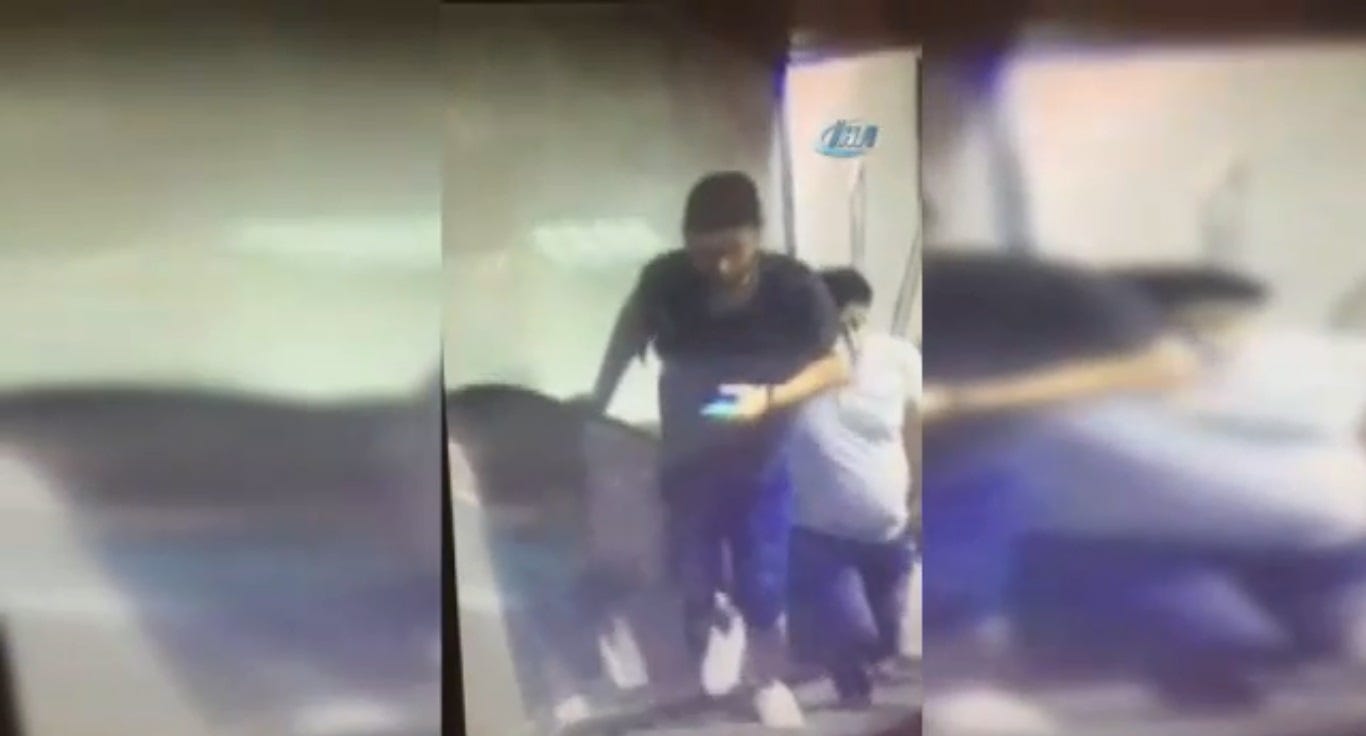
Ahmed Barakat appears to be holding a functioning phone while at an Istanbul subway station on September 19, 2017.
Ahmed also couldn’t explain how, in an area which has become known as “Little Syria” due to the number of Syrian refugees living there, he was unable to find a place to charge his phone due to his supposed inability to communicate in any language other than Arabic. Furthermore, assuming he couldn’t charge his phone, he knew exactly where Orouba worked, yet he did not go there, nor did he look for Maen at his workplace.
Another hole in Ahmed’s story was his decision to sleep rough in a park when he didn’t find Orouba and Halla at home instead of staying over at Maen’s apartment. He also could have stayed at the place of a friend of his who lives in Istanbul whom he mentioned in an earlier statement. Among many unanswered questions regarding Ahmed’s movements in Istanbul on September 19–20 was why did he use a taxi to leave the area of the crime scene instead of public transport? That was the only time throughout those two days he was seen using a taxi. If he had the money, why did he not use one the night before? Why did he walk 10 minutes down to the main road in the midday heat to hail a taxi instead of calling one to pick him up from Orouba’s apartment?
There are just way too many coincidences to deny Ahmed’s involvement in the murders, but to what degree he was involved, and to what degree he was a willing participant in the murders is still open to debate
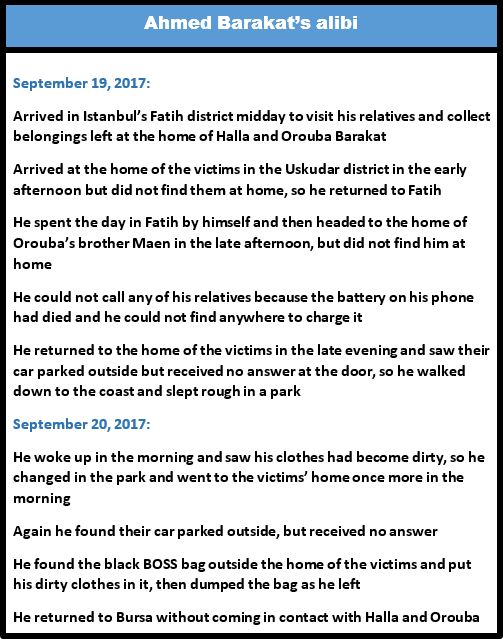
The verdict
Ahmed was handed two life sentences in March 2018 and will now spend the rest of his life in prison. Although the statements of Shaza and Maen were taken by the police and they are listed as complainants in the case, they were kept out of the loop regarding court hearings. On the day that Ahmed was being sentenced, Shaza had turned up at the Anadolu Court of Justice where the hearing was taking place to ask about the case. Unbeknownst to Shaza, the hearing had been scheduled for that day, yet nobody at the court informed her about it.
By the time the family was able to get legal advice, the 15-day time limit to launch an appeal for a retrial had already expired and the case was permanently closed. Ahmed had launched an appeal in that time, not against being found guilty, but against the length of his sentence. His appeal was duly turned down.
Shaza and Maen have both tried to speak to Ahmed in prison. His only encounter with Maen shortly after the verdict was brief, and Ahmed continued to insist on his innocence. Maen asked him if there were other accomplices, but Ahmed did not answer the question. Rather, the question enraged him, and the meeting was cut short. Ahmed has not spoken to the family since then, but guards at the prison say he receives many visitors, although they are not at liberty to say who those visitors are. Unfortunately, it appears that Ahmed will take the secrets of what happened to Halla and Orouba to his grave.
Manipulation
From what I have learned through my research, Ahmed had absolutely no personal motive to kill or in any way, shape or form be involved in a plot to kill Halla and Orouba. They were on good terms and Orouba had only ever helped Ahmed even when she herself was struggling to make ends meet. Even if they had a dispute over unpaid wages, as suggested earlier, the amount of money supposedly owed to Ahmed would not have justified the level of anger required to lash out and kill two innocent women.
Based on the accounts of those who knew and interacted with Ahmed, he was by no means rich, but at the same time was never cash-strapped to the point that one would introduce desperation as a motive. He not only had the money to cover his own needs, including luxuries such as cigarettes, he was also earning enough money to send a portion of it to his family in Syria.
Jewelry and other valuable items belonging to the victims were left untouched at the scene, so the incident was certainly not a robbery. The only item missing from the scene, which up until today has still not been found, is Orouba’s mobile phone, which last sent signals from the vicinity of the crime scene some 20 minutes before Ahmed was seen leaving the area. Contrary to some baseless rumors, Ahmed, who was still in a relationship with his girlfriend in Damascus at the time of the murders, had no romantic interest in Halla, who was two years his elder.
While it is beyond reason to deny Ahmed’s involvement in the crime, one is left with little choice but to conclude that if Ahmed was a willing participant in these murders, his motivation was political, not personal, and he was most likely just a small pawn in a grand plot, later used a scapegoat. But there are also a number of reasons Ahmed may be the victim of manipulation.
His immediate family and his girlfriend are in regime-controlled territories in Syria, while he is an escaped opposition fighter. The regime may be threatening to seek retribution from him through his loved ones, as has been common practice in this war. Another way manipulators may be taking advantage of Ahmed is through his family’s compliance in covering up the murder of his brother in Syria. Also, if Ahmed is a drug abuser as Maen claims, he is open to be manipulated through suppliers and/or sponsors. Ahmed’s lack of money woes despite the absence of consistent work and his financial dependents in Syria suggests he has never been short of other sources of income in Turkey
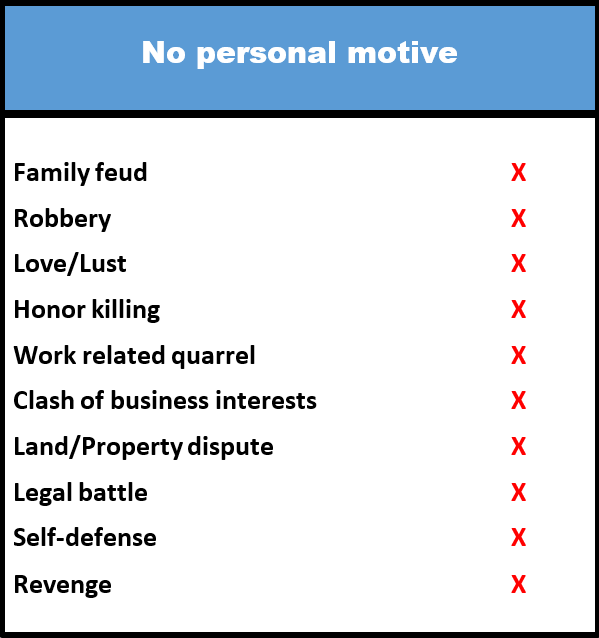
What really happened
There is little evidence to indicate that Ahmed was alone. There’s also no refuting that he was seen approaching the home of the victims just before midnight on September 19, but at the same time there is no evidence to suggest he stepped foot inside the apartment, because he would not have been able to do so without leaving fingerprints, body fluid or hair. It is more probable that Ahmed camped the night outside the apartment, within eyesight of it, possibly in someone’s car, and waited there until the morning.
At some point in the morning, Halla woke up at her regular time to go to work and turned on her bedroom light, which is visible from the street. Naturally, the first thing Halla did after waking up was go to the bathroom, hence the reason why these were the only lights found switched on when the first responders arrived at the scene. Halla was either ironing, or preparing to iron her work clothes when Ahmed somehow got her attention. Ahmed did not have a key, and even if he did, the front door had four locks on the inside, so Halla would have needed to unlock the door from within.
On noticing Ahmed’s arrival, Halla, a relatively conservative young woman, put on a bathrobe to hide her pajamas underneath. She opened the door, upon which other individuals entered the apartment. A small struggle ensued in the kitchen, but it did not last long enough or cause enough of a sound to alarm neighbors, but it was enough to alarm Orouba, who was at the time sleeping in her bed.
Orouba got out of bed, still in her nightgown, and entered the lobby, where she too was killed before she could get to Halla. Halla’s body was then dragged to the lobby and placed next to her mother’s, perhaps to make it appear as if they were both killed in one single attack instead of two separate attacks, or to clean up some evidence in the kitchen.
If Ahmed stepped foot into the apartment, it may have been at this stage. As he was helping the culprits buy enough time to conduct a minimal clean-up and change their clothes, Ahmed was left behind while the other accomplices fled the scene. The murderers most probably fled from the eastern side of Yangac Sokak in a vehicle towards the Hekimbasi neighborhood, which is completely residential and lacks security cameras.
The Hekimbasi neighborhood has many narrow, winding roads and dead ends, almost like a maze. So, the accomplices who made the getaway would have been familiar with the area and would have done a few practice runs before carrying out the murders. On the other hand, they may have fled toward one of eight streets a short distance west of Yangac Sokak — Yesim Sokak, Korkut Sokak, Barbaros Pasa Sokak, Guzel Sefakent Sitesi, Mavi Atlas Sokak, Metin Sokak and Akgungor Sokak — where accomplices may have had a lodge to which they could escape without being detected by cameras.
Ahmed was instructed to dump the evidence at a particular location, which happened to be the same area where he loitered for around six minutes on his way to the crime scene the night before. It is possible that someone on the inside was at this location to provide logistics and was in charge of eliminating certain evidences such as clothes, weapons or temporary communications devices used in the crime
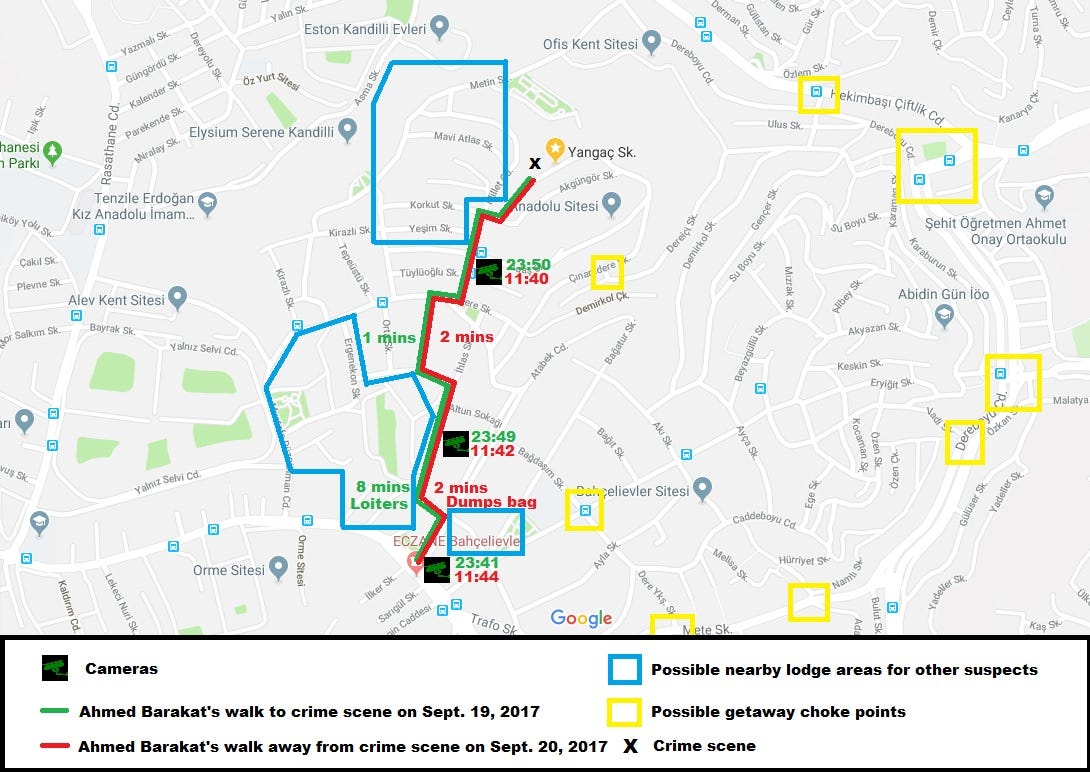
Negligence
Unfortunately, the authorities did not take into consideration that these murders may have been a planned and coordinated operation. If they had treated the crime as such, they would have looked at a record of people who had moved in or out of the area close to the date of the incident, with particular focus on the aforementioned streets.
Authorities would have also checked to see who else might have entered the area from the western side of Yangac Sokak, where security cameras are present, before 21:00 and 23:00 on September 19. Furthermore, they would have checked camera footage from the eastern outskirts of the Hekimbasi neighborhood on all possible exits from the area.
Often in pre-planned targeted attacks, culprits use a temporary phone and sim card to avoid detection. Police should have scanned the data read by the local telephone mast to see if it picked up on signals from communications devices not usually in the area.
To add, if the authorities had taken the threats against these two women seriously, prosecutors would have ordered social media platforms and messenger services such as Facebook, Twitter, Skype and WhatsApp to share the private messages and user activity of the victims. In addition to providing vital clues, a simple request for access to this information could have helped locate Orouba’s missing phone and perhaps even led to more evidence and suspects.
None of this was done.
Possible motives and culprits
Even without going into Ahmed’s family ties to supporters of the regime, it is clear that both Orouba and Halla held Bashar al Assad and his allies in contempt. That not only includes the regime itself, but also the Russian and Iranian governments, the Iranian Revolutionary Guards, the Lebanese Hezbollah militia and the Shabiha paramilitary group. They were both opponents to these factions and actively mobilized against them, and in turn regularly received threats from their supporters.
Shortly after the murders, another outspoken Syrian activist based in Germany, Maysoun Berkadar, told BuzzFeed News that she had received a death threat over the phone in which an anonymous caller told her that just as Turkish authorities couldn’t protect Halla and Orouba, German authorities would not be able to save her and her son. According to Shaza, the caller who threatened Maysoun spoke with a Lebanese accent, leading her to believe that it was most likely someone with ties to Hezbollah.
Some weeks later, Orouba’s Twitter account was hacked by regime supporters. I spoke to some cyber security experts who told me there are only three ways to hack a person’s social media account. The first being the easiest — by gaining direct access to their device. A second way to hack, they said, was tricking the person into giving away their password. The third, and most complicated way, is to install a bug onto their device which records their keypad entries, thus granting access to their password. However, in the third scenario, the targeted account must be in use at the time the hacking takes place. If Orouba’s missing phone is in the hands of the culprits, they may have gained direct access to her Twitter account through her device. Again, a simple request for information from Twitter could narrow down exactly how her account was hacked, and perhaps even the location from which the hacking took place.
On that note, I’d like to add that on August 24, 2017, which according to the prosecutor’s report was the last time Orouba and Ahmed spoke over the phone, I coincidentally received a message from Orouba over Skype. The message was a link leading to an unknown website, most likely a virus. It’s possible that some kind of bug was installed on Orouba’s phone that day
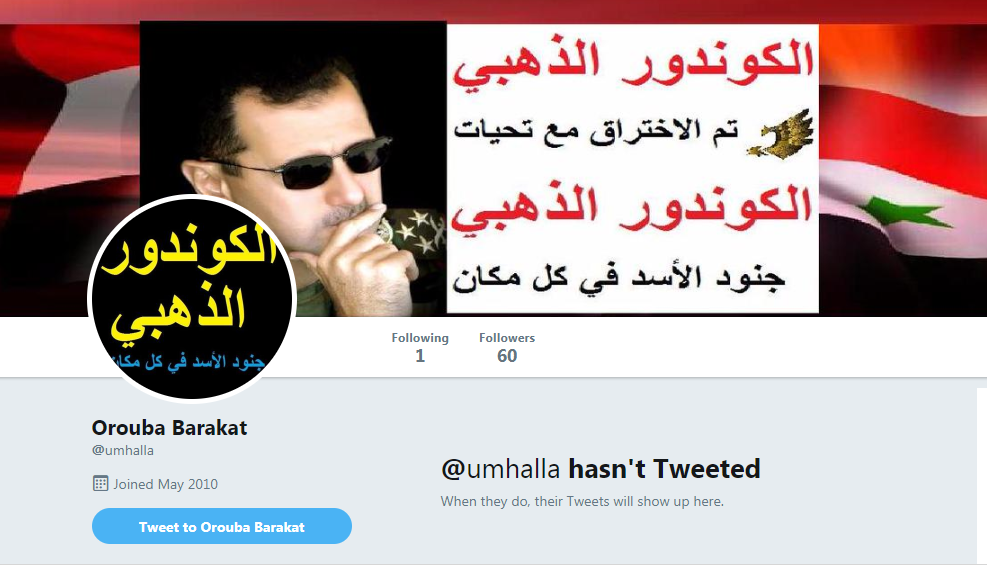
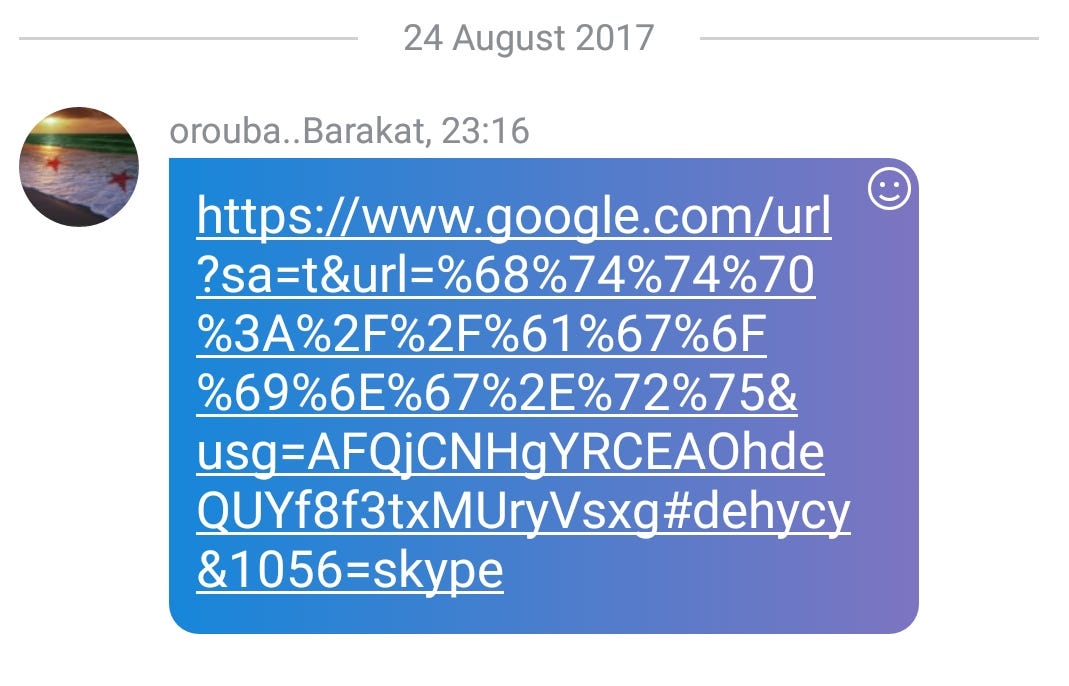
Orouba Barakat’s Twitter account was hacked by Assad regime supporters some weeks after her death. Her Skype account was also hit by some kind of virus on the day she last spoke to Ahmed Barakat over the phone
At the time of her death, Orouba was said to be conducting research into torture and extrajudicial killings in the Assad regime’s prisons in Syria. Nobody, including Shaza or Maen, have any details of the nature of her research or where she kept it, but one journalist I spoke to who was a personal friend of Orouba told me she claimed to be in possession of classified, leaked documents incriminating the regime.
But we cannot forget that Ahmed also fought for the opposition FSA. Orouba had recently fallen out with senior members of the Istanbul-based Syrian opposition, and in a WhatsApp message posted to a Syrian opposition group on August 9, 2017, she accused its leadership of selling over 100,000 fake passports to Syrian refugees who bought them for $400 each. The scheme resulted in the arrests of many Syrian refugees attempting to travel with the fake passports, while corrupt individuals in the opposition pocketed the money.
Some members of the Syrian opposition community in Istanbul with ties to its leadership warned me about approaching certain high-ranked individuals about this issue, with one individual, who was too frightened to be named in my report, explicitly mentioning that one leader, who is known to be a puppet of French interests in Syria, made direct threats against their person during a heated disagreement. Dare I say, I did actually bring this topic up with a high-ranking official in the opposition who I met at the British consulate in Istanbul. He walked away from me mid-sentence as soon as I mentioned Orouba.
After the murders, it also emerged that some four to five months prior to their deaths, the two women received a phone call from somebody speaking Arabic in a Tunisian/Moroccan accent claiming to be from ISIS. The anonymous caller warned Orouba to stop speaking or else she will be killed. A similar anonymous threat was delivered over Facebook around 10 days before the murders. Halla and Orouba had campaigned hard for the release of their friend Kayla Mueller when she was taken hostage by ISIS in 2013 and made clear their opposition to ISIS and all other actors terrorizing and dividing Syria.
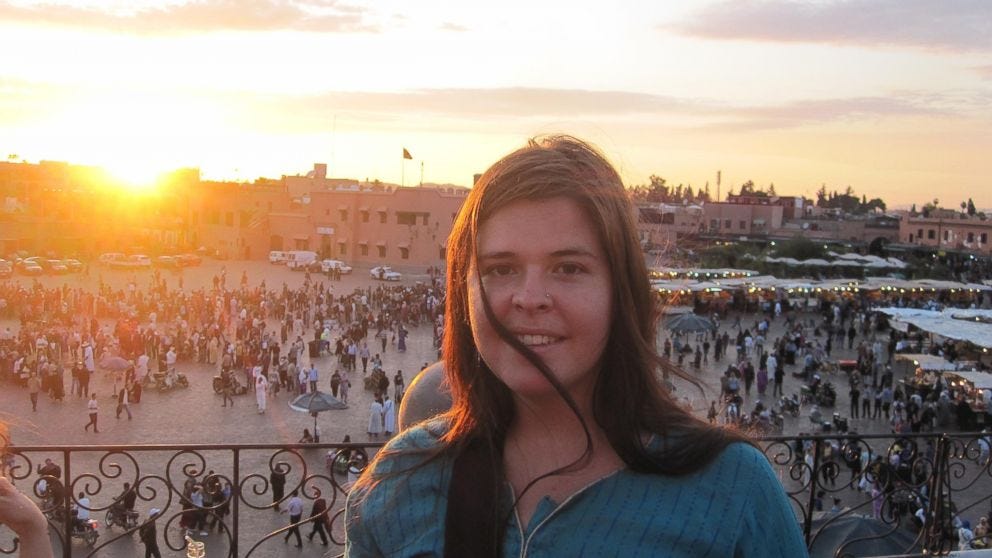
Halla and Orouba Barakat were close friends of Kayla Mueller, who was kidnapped by ISIS in Syria in 2013 and was killed in captivity in 2015
In May 2017, Halla went to Tunisia to speak on behalf of her mother at a conference. Tunisia is known to be a hotbed for ISIS support, with thousands of foreign fighters from the small North African state traveling to join the group in Syria and Iraq. Halla may have caught the wrong eye during her visit to the country. ISIS have killed at least three Syrian journalists in Turkey — one who was shot dead in Gaziantep and two who were beheaded in Sanliurfa — all in the year 2015. ISIS claimed responsibility for the Sanliurfa killings, while an ISIS member was sentenced for the Gaziantep murder. However, ISIS usually claim responsibility for their attacks, and even those they didn’t commit, to demonstrate their strength
Possible Russian connection
Many people I’ve spoken to have also brought Russia into the equation. While most doubt that Russia would actually order the deaths of these two women, they acknowledge the political leverage Russia currently yields over Turkey, which may pressure the Turkish authorities to botch the case and allow the Assad regime to come out clean, hence a possible reason why Turkish authorities turned down an offer from the FBI to help in the investigation. But some have suggested that these murders took place either upon the orders or permission of Moscow to send some kind of message, not only to the Syrian opposition, but also to policymakers in Washington.
When the Russian ambassador to Turkey, Andrey Karlov, was killed by a rogue Turkish police officer in December 2016, Halla hailed the gunman, Mevlut Mert Altintas, as a hero in a number of her public social media posts. The killer of the Russian ambassador appeared to be a lone wolf, but some speculated he had links to an outlawed network dubbed by Turkish authorities as FETO, which for decades is said to have infiltrated Turkish state institutions and worked as a parallel entity to keep Turkey within the American sphere of influence. FETO, whose leader Fetullah Gulen is being harbored in the US state of Pennsylvania, also stands accused of instructing its members who infiltrated the Turkish air force to shoot down a Russian fighter jet on Turkey’s border with Syria in 2015 in order to sabotage Ankara’s diplomatic relations with Moscow. So, a common theory among commentators at the time was that the assassination of the Russian ambassador was somehow orchestrated by the US
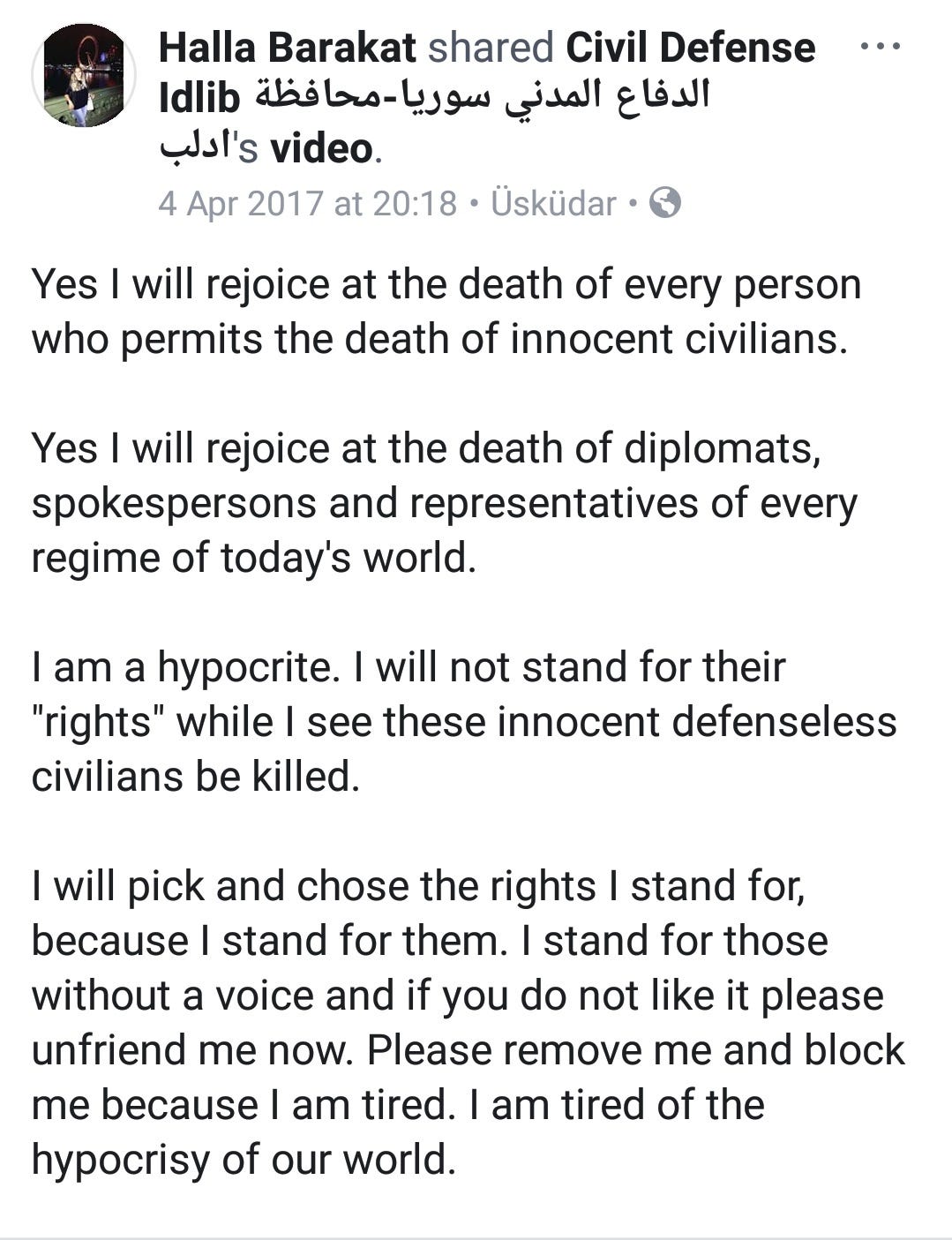
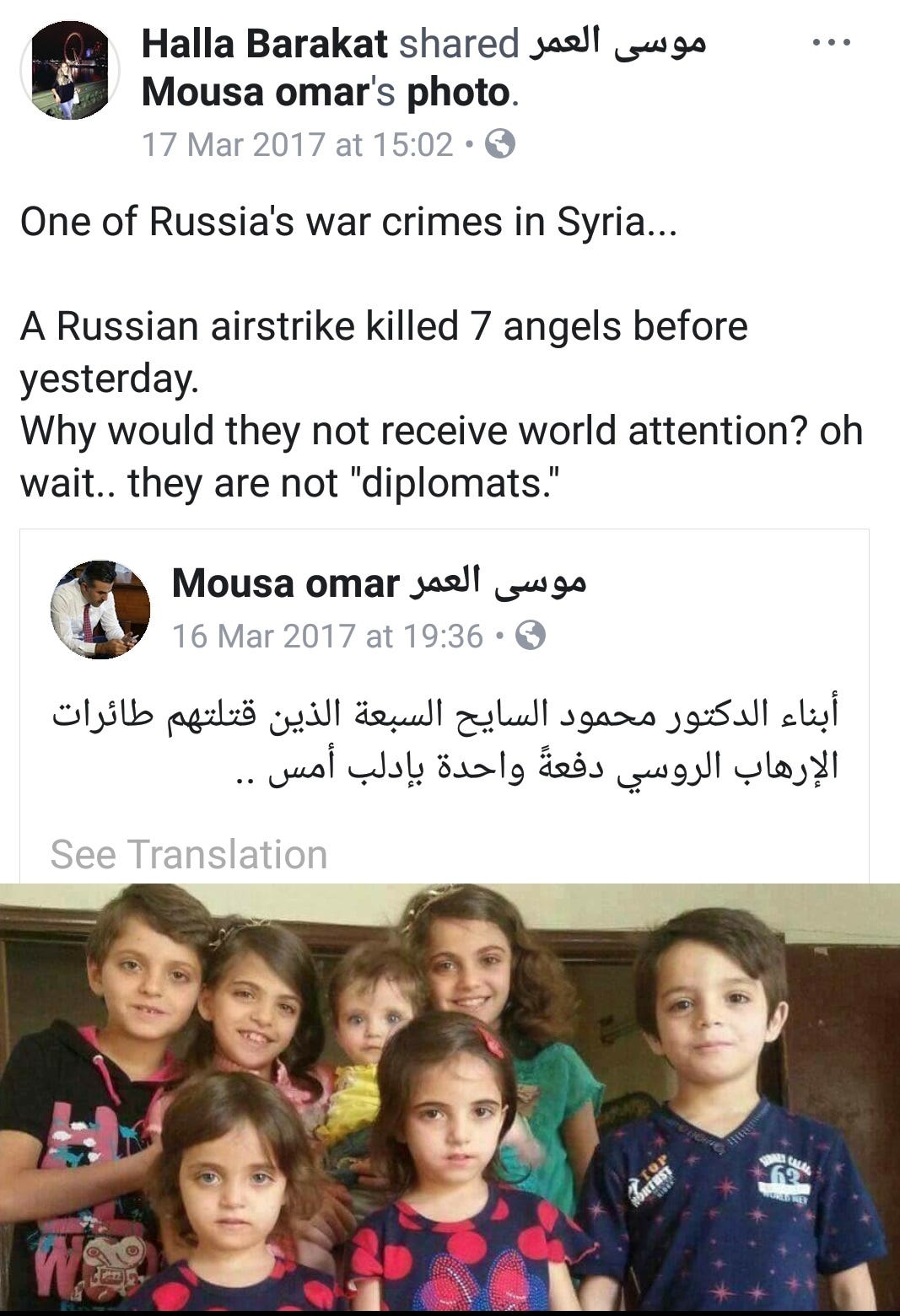
Social media posts by Halla Barakat on Facebook referring to the December 2016 assassination of Andrey Karlov, Russia’s ambassador to Turkey.
A contact of mine with close links to Turkish intelligence informed me in early 2017 that Russia had sent one of its top intelligence officials to Turkey to investigate the murder of the envoy. “Russia always gets revenge, one way or another,” he told me. My contact even told me he personally knew this official, but when I asked him for more details about this official after Halla and Orouba were killed, he denied having any knowledge, saying it was above his pay grade. Yet I remembered his words, and due to Halla being a US citizen, she may have been targeted as a reply from Moscow to Washington after attracting attention to herself through her public social media posts.
Final word
Due to Turkey’s efforts to de-escalate the Syrian conflict through cooperation with Russia, I suspected this case would be botched, considering Russia’s support for the Assad regime. I warned the victims’ family members of this early on, but they told me they had full trust in the Turkish authorities. Either way, I recommended they cooperate with the FBI should they be contacted by them.
At this stage it is unclear to me, as well as the victims’ family, whether the FBI is investigating these murders covertly. The strained diplomatic relationship between the US and Turkey right now is not helping the situation. Months ago, I submitted my notes highlighting the irregularities in the case to the US consulate in Istanbul through a third party who told them to get in touch with me if they needed to know anything else. I didn’t hear back from them.
It has taken me one full year to collect this information, put it together and make it public. I respected the legal process in Turkey and the privacy of all those involved. I tread carefully and remained within my boundaries not only for my own safety, but also for the safety of others. I have done everything I can possibly do within my limits to bring light to this case without undermining it. My only motivation has been to seek justice for my friend and her mother, and to reach some kind of personal closure by which I can place my hand on my heart and say I did for Halla what she would have done for me.
I understand that state politics often takes precedence over the plight of private individuals, and that perhaps for some wisdom and greater good that I, as a humble civilian, cannot comprehend, the Turkish authorities had no choice but to bow down to certain pressures. This is why I want to call upon those outside of Turkey to do more to answer the questions that still shroud this case.
Halla once told me her mother made the decision to give birth to her in the US because she wanted her to be part of a nation that would stand up for her as an American. Orouba didn’t want Halla to suffer the same hardships she did as an exile, constantly faced with persecution in her own country. Halla may have left the US when she was only three, but I was told that one time when she returned after a long absence, she broke down in tears when the border guard at passport control said to her, “welcome home.”
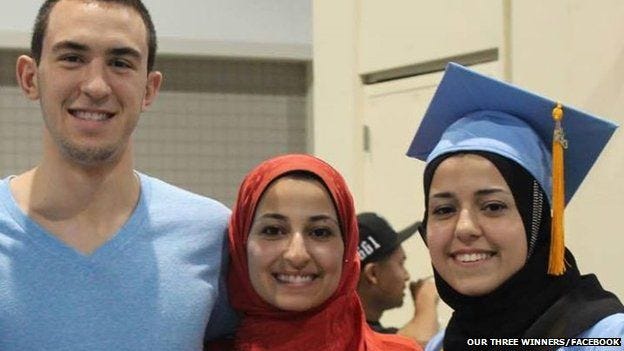
Halla Barakat was born in the home of her cousin Deah Barakat (left) in North Carolina in 1993. Deah along with his wife Yusor Mohammad Abu-Salha (center) and her sister Razan Mohammad Abu-Salha were killed in what became known as the Chapel Hill shooting in 2015.
As much as she was Syrian, Halla was an American who gave her life for the same values of freedom and humanity the US claims to uphold. When Americans hear the name Halla Barakat, they should not think of her as just another dead Syrian. They should think of her as an American hero. If the FBI drags its legs on this case, the American people should become a voice for the voiceless souls of Syria for whom Halla sacrificed her life, and keep pressuring the FBI until it fulfills its duty.
I do not expect that anyone else will be caught and charged in connection to these murders, or for the world to stop spinning on its axis for the sake of two individuals. Even if it did, it would not make any difference to me or anyone else in mourning, because nothing will ever bring these two beloved people back to us. But I want the world to know one thing: Halla and Orouba are martyrs, slain unjustly because they dared to dream of freedom, and they deserve to be remembered as such. The oppressors of this world may have taken their lives, but they should not be allowed to take their deaths away from them too.
I end this report with this Mother’s Day message posted on to Halla’s Instagram account demonstrating her unconditional love for her mother Orouba. If there is anything positive I can take from this experience, it’s that I’m glad that Halla and Orouba are together, because they would not have been able to live without each other. May they both rest in peace
